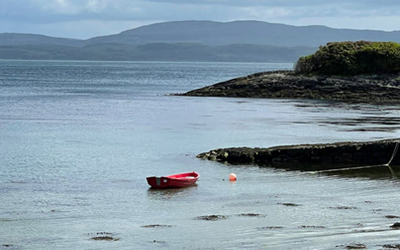Jeremy Malies on Jura: Tarbert Bay

Photo credit: Rob Marshall.
Banks of gunmetal rainclouds surround Craighouse the next morning but the skies soon clear over the Island of Goats lighthouse. There is no agenda, and our walk takes us to Tarbert Bay whose burial ground dates back to the druids. The early-medieval chapel of St Columba is just a recess in the grassland, a segment of lichen-encrusted wall the colour of old mustard, and a standing stone with Latin crosses. Didn’t Kenneth Clark say in Civilisation that St Columba’s followers used to preach to seals on the shore at Iona? The interesting stuff is obviously underground, and Historic Environment Scotland should bring archaeologists to Tarbert pronto. The protectiveness of deer (all hinds and juveniles) towards this site as they race up from the direction of Keils could make you believe they are reincarnated druidical priests. Guidebooks claim there are several standing stones (“menhirs” in the Breton language) here and we look for a noted one standing eight feet tall but can find no trace. A Google image search subsequently shows it standing out like a prick in Speedos on terrain that we surely covered so I’m at a loss.
In his diary for July 1946, Orwell records making a handle for a sledge hammer out of mountain ash. I should not have wanted to stand near him when he was using it. By contrast with fellow allegorist Arthur Miller (in The Crucible at least) who could fashion anything out of wood, Orwell struggled with such tasks. He moans throughout the diaries that he can never find a piece of straight decent timber for his carpentry which ranged from boat repairs to making toys for Richard. For cruder things there was driftwood which included pitprops that he immediately recognized from his time down mines for The Road to Wigan Pier.
Other projects included creating bedroom slippers out of rabbit pelts and casting a bathroom plug in lead. Orwell was always keen to work with his hands and never shy of admitting to failures. Friends reported that the shelves of the bookcases he made curved like a hammock. He shot rabbits with a fair level of success using a service revolver that had a heavier pull than he would have liked. He did not spend every waking hour with a loaded Luger nearby for fear of assassination by a Communist hitman as is sometimes claimed. In a letter to the translator and dramatist Michael Meyer, he admits that he does not have a firearms license but notes there is no policeman on the island!
A bird of prey (there are golden eagles and sea eagles here) with a curiously unsteady flight is overhead and carrying something string-like. Wens says that it could be anything from an adder to a hiker’s bootlace. Orwell reports seeing a buzzard carrying a rat, perhaps inwardly congratulating the buzzard. He tells us about birds minutely right down to speed of wing-flapping. This can even be analyzing sound only; on a still day he says he is able to hear a cormorant rising from the sea. That at a distance of 400 yards. He teaches us to use all our senses. The wry observations extend to every manner of wildlife, and he chuckles at a tortoiseshell so-called wildcat that he sees “stalking in a very amateurish way”. He is even able to distinguish between different types of hare when I can just about tell a hare from a rabbit. He notes that lobsters are left or right-handed – the extra claw can occur on either side.
Orwell’s main fear for the welfare of Richard was a snakebite. A diary entry for June 1946 when the boy would have just turned two, has his father encountering an 18-inch long snake (probably an adder) with a zigzag marking. Confident he had killed it after cutting it in half, Orwell picked up what he believed to be the tail end and was surprised when he was almost bitten. One of the delights of the diaries and letters for this period is the pleasure taken from Richard’s development, robust good health, usefulness around the farm and proficiency with a miniature fishing rod. Richard Blair now owns a property on the mainland more or less opposite Jura and occasionally comes over under power of sail. He attends events associated with his father.
A grey seal is flopped on a rock far out in Tarbert Bay. He is not doing much, certainly not singing since he is on his own, and not much of him is visible. Orwell describes seeing one up-close “with nose almost perpendicular, like a periscope”. Later he would remark on the animal’s inquisitiveness. Wens has now produced a lens the size and shape of a mortar, but the seal peers at us and makes off in a series of arcs towards Lagg Bay. Photography seems not to have interested our man, but his mother was keen and did her own printing which would have involved considerable effort and skill early in the century. Orwell’s sister once spotted a creature from the whale group and Richard Rees saw a shark when crossing from the mainland. Disappointed, Wens settles for photographing cormorants.
There is time to linger at Ardlussa Bay. Orwell and Richard fished for trout on the Lussa here just a mile or so inland. I wonder if the water is fresh or brackish. I think that I’m watching another seal a fair distance from the shore but there are giveaways in the form of a V-shaped wake and a generally more purposeful manner. This is fleeting contact with a sea otter who soon dives in the direction of Tramaig Bay. That is as close as it’s going to get. I should have loved to watch otters hold hands which they do when open ocean becomes choppy. Orwell is good on otters of course, noting that in addition to their standard diet of fish, they also catch lobsters. And otters can overpower larger lobsters than a fisherman would normally catch in a wicker basket. Great as the experience is, part of me feels guilty at seeing this creature since there are people in the hotel who are specifically here for sea otters, spend all their time at coves known to be favoured by them, and yet still draw a blank. That glimpse is something I shall treasure from these extraordinary few days.
I would give a lot for Orwell’s knowledge of wildlife and plants. Scouring the diaries both before and after the trip, I find that the descriptions of nature (particularly on the shore) help with things I’ve been trying to identify and have noted down. Orwell is better than any App. This is the closest I’m going to get to conversations with him, and those moments of fleeting connection are intense. There are some idols you acquire too early who later turn into walking parodies of themselves. Not so here. This subtle, charming, complicated man prompts people to trudge up that woeful track every day. Nobody in the twentieth century came closer to understanding and interrogating his own prejudices which is perhaps why Christopher Hitchens entitled his critique Why Orwell Matters. I’m proud to have clambered up the same path on which Orwell carried his three-year-old son.
Orwell left in 1949 for the last time as a passenger in his giant Austin with the destination being a sanitorium. He was now towards the front of the queue that we all form for the check-in to eternity. It might not be to Will Self’s taste, but I value the translucent writing style and try to keep to the rules in “Politics and the English Language” though no doubt I’ve broken many of them here. Orwell was surely the best social observer of his times and remains unique for having, in V. S. Pritchett’s wonderful phrase, “gone native in his own country”.
It’s the range of activity from a dying man that is dizzying. Orwell made jam and children’s toys here, combining animal husbandry with writing the ultimate dystopia. Of course he was now working from his reserve tank, but the sentences still fire off like darts. Don’t believe anybody who tells you that Jura was not good for Orwell. Potts puts us straight on that: “Ever since I had known him, he’d been given up as hopeless. During that time he’d lived a fuller life than a whole company of A.1 recruits.” The islanders (Diurachs) like to relate stories of Jura’s history and foretell things. My favourite concerns the witch who predicted that the last remaining member of the Campbell family would leave with one eye and on a horse and cart. Wens is Scottish but not a Campbell. He and I are still binocular as he eases the Merc onto the Feolin ferry.


